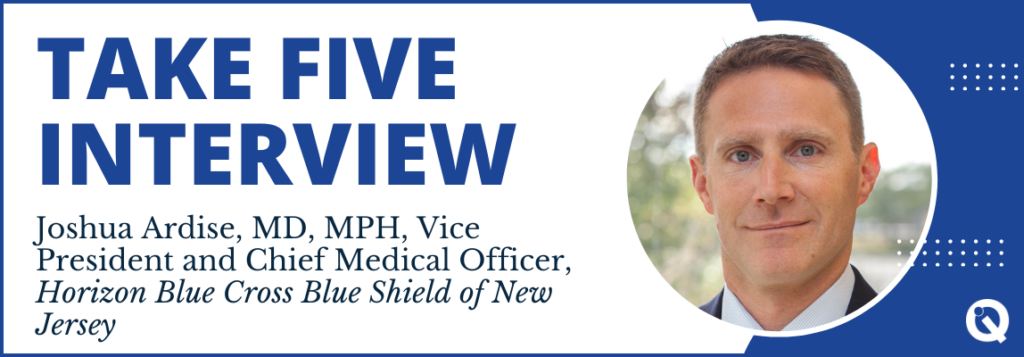Horizon Blue Cross Blue Shield of New Jersey is a member of the Quality Institute’s Leadership Council.
What are the main interventions you are taking to address the top health issues you see across Horizon’s adult membership?
In 2025, Horizon is focused on affordability. We understand how challenging managing rising health care costs can be. That’s why, as New Jersey’s largest health insurer, we are committed to addressing those challenges and ensuring that quality health care remains accessible to all. One area of focus is helping our members get the right care, at the right time, and in the right place. We ask physicians to provide clinical background as to why they’re performing a procedure in a hospital outpatient setting instead of an ambulatory surgery center (ASC). We know that care can cost about 50 percent more in a hospital and patients pay more out of their pockets for that care as opposed to care in an ASC. This will reduce costs and may help reduce patients’ medical debt.
Focusing on managing the rising cost of prescription drugs is critical given the robust pipeline of high-cost, specialty drugs. We have a series of targeted programs including robust utilization and formulary management to promote use of the most cost-effective medications, including generic and bio-similar drugs. Horizon also deploys drug transparency tools to empower members to make informed decisions on their prescription drugs. We also go beyond traditional health plan actions. For example, we co-funded adult fitness parks. The first one recently opened in Manahawkin and several others are slated to open in 2025. They are free and open to the public. Exercise, lifestyle changes, and diet are part of a comprehensive approach to combating obesity.
Finally, cancer screening. One way we’re helping members get the screenings they need is by sending colorectal screening kits to Braven Health Medicare Advantage members and dual-eligible populations to try to increase screening so that people can get earlier treatment. We also have programs such as mobile mammogram events where we can perform breast cancer screenings as well as distribute culturally appropriate information in multiple languages.
Similarly, what are the main interventions you are taking to address the top health issues you see across Horizon’s pediatric membership?
Although the youth mental health crisis existed pre-pandemic, data collected by the CDC suggests the prevalence continues to worsen. Yet only about 50 percent of children ages 6- to 17 who were diagnosed with a mental health condition received treatment. To address this need, we launched the Youth Integrated System of Care program to address serious mental illness and substance use disorder. We also expanded access to youth specialty services, including virtual and in-person therapy, support for families, psychiatry services, virtual intensive outpatient care, and eating disorder treatment. We also launched the Emergency Department Diversion Pilot for Youth to keep kids out of the emergency rooms when they need crisis evaluation. We have great resources.
Asthma in the Medicaid pediatric population is a public health issue and Horizon started an interdisciplinary team that collaborates on a pilot program with RWJBarnabas to help better manage these members to reduce hospitalizations and ER visits.
What has been the impact — or potential impact — of Horizon’s joint venture to support independent primary care practices?
We are committed to the success of independent physician practices in New Jersey, for primary care and specialty care physicians. We’ve implemented payment transformation initiatives, including new alternative payment models for both primary and specialist practices. After research and discussions with independent physicians, we partnered with Deerfield Management Company to launch a joint venture last year. The focus is physician enablement to maintain, even increase, independent practices in New Jersey, especially primary care. We want to provide physicians who are either currently independent and looking at their choices — maybe being bought by private equity or a large hospital system — to have the ability to stay independent, should they want to, because we believe the value they bring to New Jersey is significant.
What is a top priority in 2025?
As I mentioned earlier, our top priority is making sure our members have affordable, high quality health care.
Horizon has a responsibility to our members to manage health care costs so we can continue to provide them with access to affordable, quality care.
Like many other health plans nationwide, we are facing difficult discussions with providers about their unreasonable requests for high reimbursement rates, with many of these providers threatening to go out of network. As New Jersey’s largest health insurer, we are committed to working with doctors and hospitals to make sure that cost is not a barrier to our members getting the care they need.
Can you describe an experience in your life that significantly impacted who you are today?
As a third-year medical student, I was diagnosed with cancer. Fortunately, it was caught very early and required only one surgery, no chemo or radiation. When you are training to become a doctor there is no better experience to have than to be a patient at the same time. It really taught me the importance of the doctor-patient relationship and how the little things that clinicians do, like bringing you a warm blanket in the recovery room, matter. And it’s those little things that have stayed with me throughout my career. I work on the health insurance side, but the doctors, the nurses, the other practitioners are the ones who deliver care to Horizon’s members. That perspective allows me to work with hospitals and providers in a way that is personal and respectful of what they’re doing every day and what they go through while providing care to our members.

